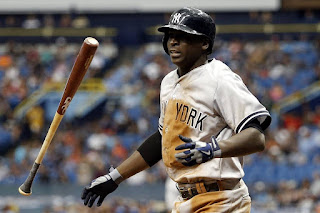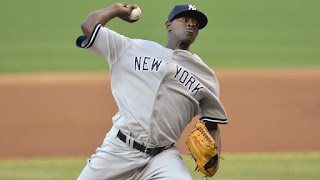Yankees arbitration recap
With
most of the Yankees offseason wrapped up, a few loose ends remained. The team is not expected to make any more
moves via free agency or add anyone via trades, however, business was
still to be done with the seven Yankees who were up for arbitration.
Photo Credit: Jim McIsaac/Getty Images
For
those of you who are unfamiliar with rookie contracts, I'll quickly break down
how they work and get right into the arbitration process. Initial rookie contracts contain three years
of team control at the league minimum salary, after which the players are
arbitration eligible for three more years.
All in all, this represents six years (five if a player qualifies for
"Super Two" status) of initial control on
a newly drafted player, with team control transferable through trades. The only
exceptions to this six year window are with International signings, or when a
club chooses to non-tender a player, usually due to injury concerns.
This
winter, all seven Yankees who qualified for arbitration were given a fair shot
at the process and – at the point of the article – only one will be headed to
an arbitration hearing. The seven
Yankees who went through the arbitration process this season were Didi
Gregorius, Michael Pineda, Dellin Betances, Aaron Hicks, Adam Warren, Tommy
Layne and Austin Romine.
Typically
the way the arbitration process works is the player and his agent come to the
negotiation table with one figure, the team with another, and they either
settle somewhere in the middle, or they cannot agree upon an amount and they
take their argument before an arbiter who determines with of the two figures is
the most fair. These hearings are held
in early February and have a history of getting pretty heated between player
and club.
Six
of these players settled contracts with the Yankees before having to go to
arbitration, leaving only Dellin Betances unsigned at this point. Contracts (all one-year deals) for the six
Yankees who have already signed are as follows (all figures per MLBTR's Arbitration Tracker):
·
Michael
Pineda – third and final
year of arbitration eligibility – $7.4 million
·
Didi
Gregorius – second
year of arbitration eligibility – $5.1 million
·
Adam
Warren – second year of
arbitration eligibility – $2.29 million
·
Aaron
Hicks – first year of
arbitration eligibility – $1.35 million
·
Tommy
Layne – first year of
arbitration eligibility - $1.075 million
·
Austin
Romine – first year of
arbitration eligibility - $805,000
This,
of course, leaves us with Dellin Betances.
Betances – also in his first year of arbitration – filed at $5 million,
while the Yankees filed at $3 million.
With a two-million dollar gap between the two and neither side willing
to budge, the arbiter will ultimately be the one to decide Betances' salary for
2017.
Interestingly
enough, the Yankees have not gone to an arbitration hearing a single time since
they last did with Chien-Ming Wang way back in 2008.
From
the Yankees' perspective, I get not wanting to increase Dellin's contract by a
factor of 10 (he made just $507k at the league minimum last season) in just his
first season of arbitration eligibility because it sets him up for even larger
contracts over the next two seasons.
However, Betances has been among
the league leaders in innings pitched among relievers, appearances, strikeouts
and K/9 in each of the last three seasons since he assumed the set-up man role
behind David Robertson in 2014. His body of work is worthy of such a pay raise.
Follow @BronxBomberBlog
Article by: Andrew Natalizio
Follow @anatalizio0523Follow @BronxBomberBlog



Comments
Post a Comment